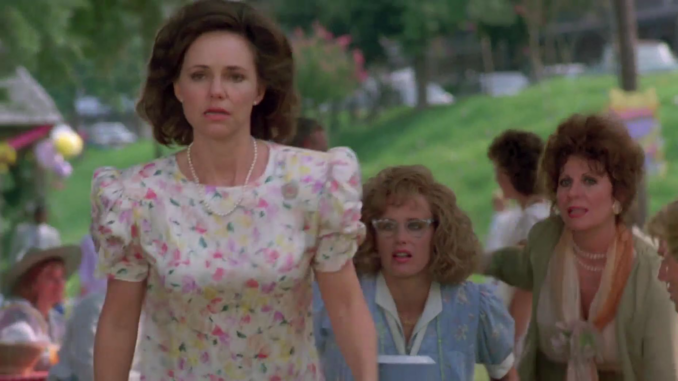
In the realm of cinematic performances, there are few that leave as lasting an impression as Sally Field’s portrayal of M’Lynn Eatenton in Steel Magnolias. Released in 1989, the film remains a beloved classic not only for its portrayal of strong female relationships and the deep love between mothers and daughters but also for the emotional depth Sally Field brings to the story.
At the heart of Steel Magnolias is a universal theme—grief. M’Lynn’s journey through the loss of her daughter, Shelby, showcases a raw and powerful exploration of the five stages of grief: denial, anger, bargaining, depression, and acceptance. Sally Field’s remarkable ability to capture these complex emotions with authenticity and tenderness has cemented her role in this film as one of the most memorable performances in modern cinema.
In this article, we’ll take a deep dive into Sally Field’s unforgettable performance in Steel Magnolias, exploring why her role as M’Lynn will always remain a classic and resonate with audiences for generations to come.
The Essence of Steel Magnolias and M’Lynn’s Grief Journey
Before we delve into Field’s performance, it’s important to understand the emotional landscape of Steel Magnolias. The film, set in the small town of Chinquapin, Louisiana, focuses on the lives of a tight-knit group of Southern women who share laughter, love, and sorrow. But at the core of the film is M’Lynn, a mother who must cope with the heart-wrenching loss of her daughter, Shelby (played by Julia Roberts).
Sally Field’s portrayal of M’Lynn is far from a simple mother-daughter story; it is a profound meditation on the complexities of grief, the role of family and friends in healing, and the resilience of the human spirit. Field’s performance transforms what could have been a predictable narrative into an emotionally layered journey that feels deeply personal and universally relatable.
1. Denial: A Mother’s Protective Instincts
M’Lynn’s journey begins in a place that many people find themselves when faced with the reality of a loved one’s serious illness: denial. Shelby’s health issues, primarily caused by her diabetes, are serious, but M’Lynn refuses to fully accept the severity of her daughter’s condition. She clings to the hope that everything will be fine, convincing herself—and those around her—that things are under control.
Sally Field’s performance in this stage is subtle but impactful. Her quiet refusal to acknowledge the reality of Shelby’s illness speaks volumes about a mother’s natural instinct to protect her child. Field’s nuanced portrayal of M’Lynn’s internal conflict—wanting to fight the inevitable while still holding onto the hope that everything will be okay—is both heart-wrenching and relatable. It’s a testament to her ability to convey complex emotions through minimal dialogue and expressive body language.
2. Anger: The Unfairness of Loss
As Shelby’s condition worsens, M’Lynn’s denial starts to give way to anger. Sally Field brilliantly transitions her character into this second stage of grief, showing a mother who is furious not at Shelby, but at the universe for being so unfair. In one of the film’s most powerful scenes, M’Lynn explodes with emotion, crying out against the injustice of her daughter’s suffering. This is not just anger; it is the frustration and helplessness of a mother who feels powerless in the face of something she cannot control.
Field’s anger is raw, real, and completely unfiltered. She is not afraid to show the ugly side of grief—the part where you feel lost, betrayed, and abandoned. This stage in M’Lynn’s grief process is a pivotal turning point, and Field’s performance is truly remarkable in its emotional depth.
3. Bargaining: Trying to Make Deals with Fate
The bargaining stage of grief is often marked by an inner struggle to change the course of events, to make a deal with fate. For M’Lynn, this stage is seen in her desperate attempts to do whatever she can to save her daughter. She tries to convince the doctors, the people around her, and even herself, that Shelby’s condition isn’t as serious as it seems, or that there is some way to reverse the damage.
Field’s portrayal of M’Lynn during this phase is a heartbreaking exercise in denial wrapped in hope. You can feel her desperation in every scene. There’s a moment where M’Lynn says, “Shelby is going to be fine,” and Field delivers these lines with a quiet, fragile conviction that is as devastating as it is poignant. It is in these small moments that Field’s ability to evoke empathy and sorrow becomes most apparent.

4. Depression: A Grief Too Deep for Words
As Shelby’s death becomes more imminent, M’Lynn’s grief reaches its most overwhelming and debilitating point: depression. Sally Field’s portrayal of this stage is devastating. It’s the stage where all the emotions M’Lynn has been suppressing come flooding to the surface, and she is left to grapple with the crushing weight of her loss.
Field captures the emptiness and hopelessness that accompany depression with such authenticity that it feels as if M’Lynn is speaking for anyone who has ever had to come to terms with the death of a loved one. Her body language becomes more slumped, her voice quieter, and her eyes duller as she faces the realization that her daughter is truly gone. This is one of Field’s most emotionally raw moments in the film—one where the character’s pain is so palpable that it pulls you in, making you feel every ounce of her sorrow.
5. Acceptance: Finding a New Normal
The final stage of grief, acceptance, is not about forgetting or “moving on.” It is about learning to live with the loss, finding ways to carry the grief while still embracing life. For M’Lynn, acceptance doesn’t come easily, but by the end of Steel Magnolias, we see her begin to heal—not because she has overcome the pain, but because she has learned to live with it.
In the final scenes of the film, Field’s performance takes on a quieter, more subdued tone. M’Lynn has come to understand that Shelby’s death is part of the fabric of her life now, and while the grief will never fully disappear, she can find solace in the love and support of her friends. Field’s portrayal of M’Lynn’s subtle shift toward acceptance is beautifully understated, showcasing her ability to convey strength without the need for grandiose speeches or dramatic gestures. This final stage of M’Lynn’s journey is a testament to Field’s range as an actress, demonstrating her ability to balance raw emotion with quiet, introspective strength.
Why Sally Field’s Performance Will Always Be a Classic
Sally Field’s portrayal of M’Lynn Eatenton in Steel Magnolias will forever be remembered as one of the greatest performances in film history. Through her portrayal of the five stages of grief, Field not only captures the pain and heartbreak of a mother’s loss, but also the resilience and strength required to move forward.
What makes her performance timeless is its universality. Everyone has experienced some form of loss, and Field’s portrayal of grief is relatable to anyone who has been touched by death. Her ability to show the vulnerability, rage, desperation, and quiet strength that come with grief makes M’Lynn’s journey one that resonates deeply with audiences, regardless of their background or experience.
Ultimately, Sally Field’s performance in Steel Magnolias is a masterclass in acting, capturing the full spectrum of human emotion with nuance, honesty, and authenticity. Her portrayal of M’Lynn Eatenton is not just a career-defining role, but a cultural touchstone that will continue to move audiences for generations to come.
Conclusion: A Legacy of Grief, Strength, and Healing
Sally Field’s role in Steel Magnolias will always be a classic because it speaks to the heart of what it means to grieve and to heal. Through the character of M’Lynn, Field delivers an unforgettable performance that transcends the film itself, leaving an indelible mark on cinema and on viewers’ hearts. Whether through the subtlety of denial, the intensity of anger, or the quiet strength of acceptance, Field’s portrayal of grief is as universal as it is timeless.
In a world that often rushes through difficult emotions, Sally Field’s performance in Steel Magnolias reminds us of the importance of taking the time to truly feel, to grieve, and to find healing, no matter how long it takes. It’s a lesson in the power of human resilience, the depth of love, and the quiet strength that comes from enduring life’s hardest moments.
